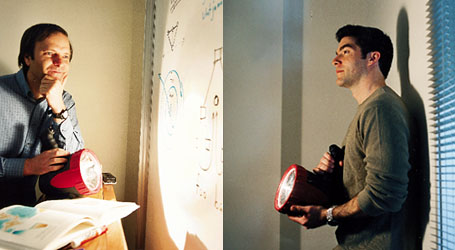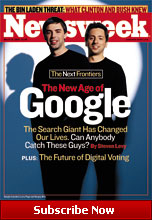|
|
 |

Photos by Timothy Archibald
for Newsweek
Up and coming: A9's Udi
Manber (left) and Yahoo's Jeff Weiner both say search engine technology
will improve dramatically in the years to come |
It cost more than a billion dollars—most of it buying technology—but Yahoo is now making its bid to be a Google buster. Last month it unveiled a rebuilt engine, which spits out results comparable to the other guy's. The long-term strategy is to tap the treasure house of information that lives elsewhere on the busy Yahoo portal. So your search might draw from Yahoo's traffic reports, shopping services, maps, financial data and hot Britney gossip. "Search results are not enough," says Weiner. "We're going to add another layer."
| advertisement |
Meanwhile, Google has innovated with a program it calls AdSense, which places ads on Web sites that don't belong to Google—other businesses, nonprofit or academic institutions and even blogs. The effects are only gradually becoming apparent. Software designer Tim Bray was impressed when he signed up for AdSense ads on his blog—he says it changed an expensive hobby to a profitable sideline—but worries that the pressure to expose the ads to new users might tempt people to alter their content to boost ad revenue.
|
Competitors are popping out of the woodwork and even coming back from the dead. One rival is a rejuvenated Ask Jeeves, a onetime dot-com bubble casualty. In 2001, it acquired the technology and the engineering team behind the highly regarded search technology of Teoma.
Of course, Google's biggest problem may well be (cue soundtrack from "Jaws") Microsoft. Bill Gates is constitutionally unable to countenance the idea that a cheeky Silicon Valley start-up can claim even the mildest role as an Internet gateway. Last autumn Gates told NEWSWEEK that his company's complacency in search was a grave error that would soon be corrected. "We didn't make it as much of a priority as we should have," he said. "We recognized that, and we're on the job." At the World Economic Forum earlier this year, he was even more frank: "[Google] kicked our butts," he said.
The last time Microsoft felt similarly embarrassed—when it failed to notice that the Internet was kind of going to be a big thing—Gates started a companywide jihad that didn't stop until his competitor was eviscerated. Now there's even a word for what happens when Microsoft leverages its monopoly power to flip a rival into the toaster: Netscaped. You wouldn't blame its rivals for quaking in their query fields.
Instead, Googlers claim that this time it's the Softies who are out of their league. Anna Patterson, a Stanford search wizard recruited by both companies (she chose the Googleplex), had the chance to evaluate Microsoft's talent. Not impressed. "It's a bunch of people at the first grade," she says. "Eight junior programmers who don't know anything about search."
Microsoft's answer: just wait. "I'm more than glad to have people underestimate what we can do," says the VP in charge of Microsoft's search effort, Yusuf Mehdi. "You can't remotely discount the level of technical talent we have devoted to this."
|
The next step might well be called "Stuff I Should See." It involves another process cooked up by its think-tank people called Implicit Query. "Too often, searching means stopping what you're doing, open a browser and type in a query," says researcher Eric Horvitz. His alternative is software that figures out what you might want to ask for, depending on what you're doing. Only Microsoft, which provides most people's mail software, word processing and desktop, is positioned to launch such an approach. And the radically revamped file-handling system planned for the next version of Windows, codenamed Longhorn, happens to be perfectly suited to handle complicated searches. In short, if Microsoft pulls off its goals (easier said than done), it can offer people a richer version of search than Google can deliver—even before they bother to type their queries into a search field.
Continued
Page 1: It's Good to Be
Google
Page 3: Could Google be
"Netscaped?"
|
|
|







